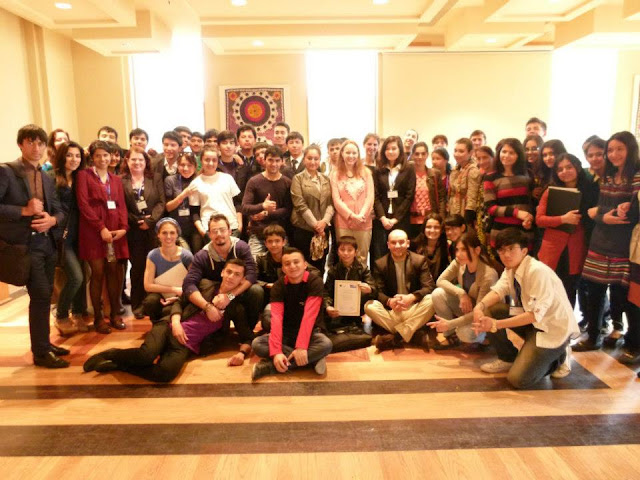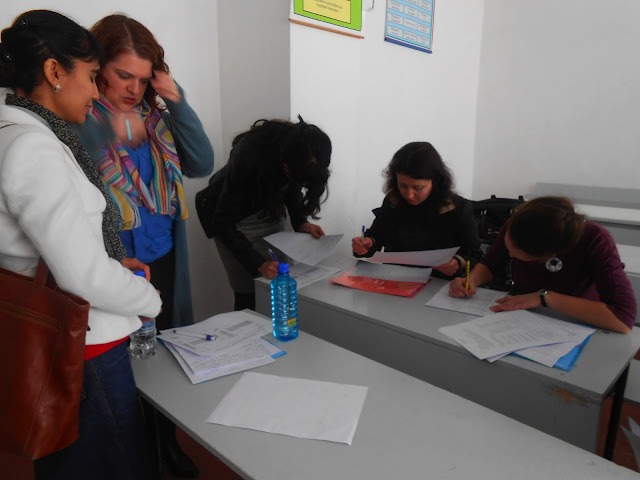I said before that I cared more about my students in Khujand than the tournament that was to come in Dushanbe. That was before we went to Dushanbe for the First National English Debate Tournament (March 29-31). I still am proud of what we did in Khujand, but being with students from all over the country brought it to a new level. Granted, there were many differing levels of debate experience and ability, but the excitement of a tournament - with four preliminary rounds in which everyone would compete - was motivation to make all of them improve immensely.
I was staying with the main organizer, and was part of the late-night planning and anxiety about making everything run smoothly. I was one of the judges; I (hilariously) gave the orienting/rules presentation to the debaters while the judges were meeting; I ended up giving out the certificates at the end. The whole thing took place at the gorgeous Ismaili Centre, which made everything more graceful. I enjoyed the planning and the executing and the walking around with my students in the city and the talking in the car through the snow on the seven hours back home.
There are plenty more photos where those came from; and the video that Areebah and I finally had time to make - a version of the presentation we did in Nepal for future English teachers.
Of course, pretty much as soon as we put it together, we realized how little we knew about international debating and learned a whole lot. We made it to the Asia Youth Forum, after a flurry of calls to parents about permissions and passports all during and before and after the tournament in Dushanbe.
I will let IDEA describe it:
Of course, pretty much as soon as we put it together, we realized how little we knew about international debating and learned a whole lot. We made it to the Asia Youth Forum, after a flurry of calls to parents about permissions and passports all during and before and after the tournament in Dushanbe.
I will let IDEA describe it:
The Asia Youth Forum, one of many regional versions of the IDEA Global Youth Forum, is a two-week experience that combines the Karl Popper Debate Championship, educational tracks (including our Mixed Teams Track which brings students from different countries and different levels of experience together in a peer-to-peer learning experience) and tournaments that allow the speakers to put their newly-acquired skills into practice. Find out more at ayf.idebate.org
This year, AYF was at Lake Issykkul in Kyrgyzstan - but we were more in Debate-istan than Kyrgyzstan. They ran a full schedule for the kids, who learned a lot. They had to really work and prepare for their cases - I'm not sure I would have the intellectual stamina to prepare again and again on the same topic in another language. I joined them the second week, for various reasons, and so entered this culture with full awareness of my ignorance and a bit of trepidation. I was glad to see my students, and intrigued by the trainers and coaches. The Tajik students did really well; one of my students from Khujand made it to the Semi-Finals in the Mixed Team Tournament, while the winning team included one student from Khorog and one from Dushanbe.
There are too many photos to count: the Russian IDEA Facebook page, all of my students' Facebook posts, the Asia Youth Forum website. They also interviewed people on
what digital freedom means to them and in their countries, and my video is one of the ones that has
been posted. More importantly, the talent show hit "Debate Me, Maybe" has reached YouTube - again courtesy of Areebah's editing.
 |
| This was where we were staying. Yes, you should visit Issykkul. |
 |
| The view from our room. |
We returned home on April 23 to TV cameras at the airport - and then a long drive to Khujand, with one student asleep on each shoulder in the middle seat of the taxi. According to their presentation yesterday at the American Corner, they not only made friends that they left with tears, but also learned about the roles in Karl Popper, what clash points are in a debate, more ideas about Digital Freedom than they ever thought to have, the importance of team-building and sportsmanship, and how to communicate with people from other countries when it is difficult. That's a success to me.








